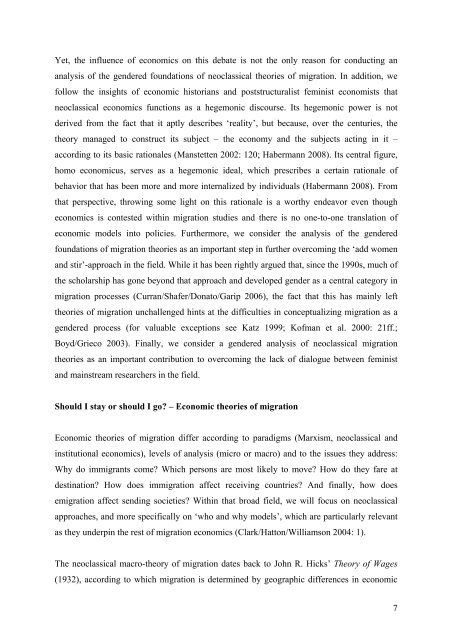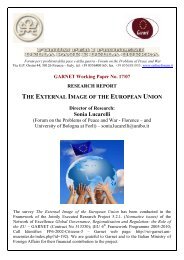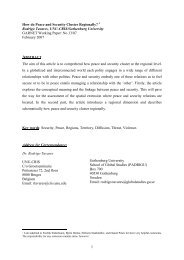1 Gender Knowledge in Economic Migration Theories and in - Garnet
1 Gender Knowledge in Economic Migration Theories and in - Garnet
1 Gender Knowledge in Economic Migration Theories and in - Garnet
You also want an ePaper? Increase the reach of your titles
YUMPU automatically turns print PDFs into web optimized ePapers that Google loves.
Yet, the <strong>in</strong>fluence of economics on this debate is not the only reason for conduct<strong>in</strong>g an<br />
analysis of the gendered foundations of neoclassical theories of migration. In addition, we<br />
follow the <strong>in</strong>sights of economic historians <strong>and</strong> poststructuralist fem<strong>in</strong>ist economists that<br />
neoclassical economics functions as a hegemonic discourse. Its hegemonic power is not<br />
derived from the fact that it aptly describes ‘reality’, but because, over the centuries, the<br />
theory managed to construct its subject – the economy <strong>and</strong> the subjects act<strong>in</strong>g <strong>in</strong> it –<br />
accord<strong>in</strong>g to its basic rationales (Manstetten 2002: 120; Habermann 2008). Its central figure,<br />
homo economicus, serves as a hegemonic ideal, which prescribes a certa<strong>in</strong> rationale of<br />
behavior that has been more <strong>and</strong> more <strong>in</strong>ternalized by <strong>in</strong>dividuals (Habermann 2008). From<br />
that perspective, throw<strong>in</strong>g some light on this rationale is a worthy endeavor even though<br />
economics is contested with<strong>in</strong> migration studies <strong>and</strong> there is no one-to-one translation of<br />
economic models <strong>in</strong>to policies. Furthermore, we consider the analysis of the gendered<br />
foundations of migration theories as an important step <strong>in</strong> further overcom<strong>in</strong>g the ‘add women<br />
<strong>and</strong> stir’-approach <strong>in</strong> the field. While it has been rightly argued that, s<strong>in</strong>ce the 1990s, much of<br />
the scholarship has gone beyond that approach <strong>and</strong> developed gender as a central category <strong>in</strong><br />
migration processes (Curran/Shafer/Donato/Garip 2006), the fact that this has ma<strong>in</strong>ly left<br />
theories of migration unchallenged h<strong>in</strong>ts at the difficulties <strong>in</strong> conceptualiz<strong>in</strong>g migration as a<br />
gendered process (for valuable exceptions see Katz 1999; Kofman et al. 2000: 21ff.;<br />
Boyd/Grieco 2003). F<strong>in</strong>ally, we consider a gendered analysis of neoclassical migration<br />
theories as an important contribution to overcom<strong>in</strong>g the lack of dialogue between fem<strong>in</strong>ist<br />
<strong>and</strong> ma<strong>in</strong>stream researchers <strong>in</strong> the field.<br />
Should I stay or should I go? – <strong>Economic</strong> theories of migration<br />
<strong>Economic</strong> theories of migration differ accord<strong>in</strong>g to paradigms (Marxism, neoclassical <strong>and</strong><br />
<strong>in</strong>stitutional economics), levels of analysis (micro or macro) <strong>and</strong> to the issues they address:<br />
Why do immigrants come? Which persons are most likely to move? How do they fare at<br />
dest<strong>in</strong>ation? How does immigration affect receiv<strong>in</strong>g countries? And f<strong>in</strong>ally, how does<br />
emigration affect send<strong>in</strong>g societies? With<strong>in</strong> that broad field, we will focus on neoclassical<br />
approaches, <strong>and</strong> more specifically on ‘who <strong>and</strong> why models’, which are particularly relevant<br />
as they underp<strong>in</strong> the rest of migration economics (Clark/Hatton/Williamson 2004: 1).<br />
The neoclassical macro-theory of migration dates back to John R. Hicks’ Theory of Wages<br />
(1932), accord<strong>in</strong>g to which migration is determ<strong>in</strong>ed by geographic differences <strong>in</strong> economic<br />
7





